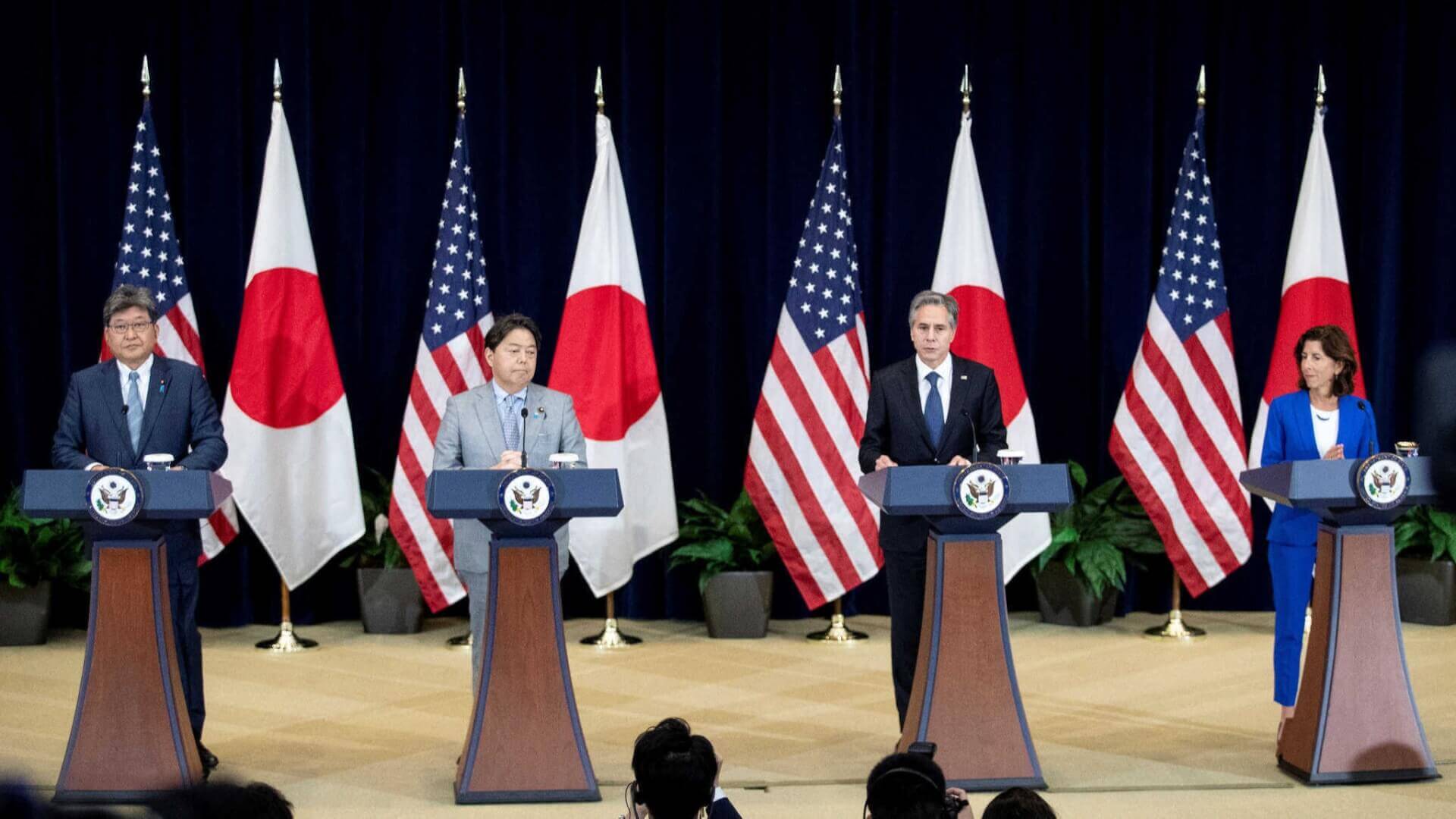During the Japan-United States (US) Economic Policy Consultative Committee, otherwise known as the ‘Economic 2+2’, on Friday, Washington and Tokyo slammed Russia’s “brutal, unprovoked, and unjustified aggression against Ukraine” and Chinese aggression across the Indo-Pacific.
Stressing on the joint role the two countries must play in ensuring a “free and open rules-based international economic order” as well as “sustainable and inclusive economic growth,” the officials said they would work to “counter attempts to use economic power for self-serving interests.”
This vital and ongoing dialogue will strengthen our bilateral cooperation. Together, the U.S. and Japan, as the two largest democratic economies, can address global economic challenges and the pursuit of open, inclusive, and sustainable economic growth. https://t.co/QGplC2P7nq
— Secretary Antony Blinken (@SecBlinken) July 29, 2022
Noting that the combined effects of the COVID-19 pandemic and the Russia-Ukraine war have created supply chain disruptions, increase prices, and ‘widened’ inequality, Japan and the US noted with concern the thread to global energy and food security.
Japan was represented by Foreign Minister (FM) Hayashi Yoshimasa and Minister of Economy Trade and Industry Hagiuda Koichi, while the US was represented by Secretary of State Antony Blinken and Secretary of Commerce Gina Raimondo.
A press release by the Japanese Ministry of Foreign Affairs following the two-hour meeting stressed on four guiding principles: Realizing Peace and Prosperity through the Rules-Based Economic Order; Countering Economic Coercion and Unfair and Opaque Lending Practices; Promoting and Securing Critical and Emerging Technologies and Critical Infrastructure; and Strengthening Supply Chain Resilience.
Today we co-hosted, together with @SecRaimondo, the inaugural ministerial meeting of the U.S.-Japan Economic Policy Consultative Committee with Japanese Foreign Minister Hayashi Yoshimasa and Minister of Economy, Trade and Industry Hagiuda Koichi at the @StateDept. pic.twitter.com/spNT2X224E
— Secretary Antony Blinken (@SecBlinken) July 29, 2022
To this end, they underscored the importance of their engagement through bilateral and multilateral platforms like the US-Japan Economic Policy Consultative Committe, G7, G20, Asia-Pacific Economic Cooperation, Indo-Pacific Economic Framework (IPEF), World Trade Organization, and Organisation for Economic Co-operation and Development.
In a joint statement, both sides “shared the view that it [Ukraine invasion] has exacerbated such challenges and undermined energy and food security around the world.” The diplomats also “affirmed the need to address the climate crisis in the face of complications due to energy insecurity.” To this end, the four diplomats also discussed how to aid countries “severely affected by Russia’s aggression against Ukraine.”
On a trip to the US, #meti_minister Hagiuda attended the First Japan-U.S. Economic Policy Consultative Committee (Economic "2+2") Meeting with Foreign Minister Hayashi, US Secretary of State Blinken and Secretary of Commerce Raimondo. pic.twitter.com/MPHQCm4I3W
— METI, Japan (@METI_JPN) August 1, 2022
“The United States and Japan stand for open, sustainable, and inclusive economic growth that delivers prosperity, upholds democratic values, reduces economic disparities, and protects human rights in the Indo-Pacific region and beyond,” their statement read.
They also agreed that post-pandemic recovery remains incomplete and could be accelerated via the adoption of various technologies and digital transformation. “They noted technological innovation – including in critical and emerging technologies such as artificial intelligence, quantum technologies, and renewable and circular technologies – presents transformative potential,” as well as economic risks, if abused, the joint release read.
I welcomed @MofaJapan_en Hayashi to the @StateDept today. We are resolute and united in holding Russia accountable and ending its war against Ukraine and strengthening the U.S.-Japan Alliance to promote peace, security, and prosperity in the #IndoPacific region. pic.twitter.com/DJWvr2Fudw
— Secretary Antony Blinken (@SecBlinken) July 29, 2022
On the topic of technology, they also underscored the importance of cyber surveillance and microelectronics to confront the ‘misuse’ of new technology by “malicious actors.”
To this end, Tokyo and Washington committed to continue taking steps to realise a “full and sustainable recovery from the pandemic and enhance the international order in the post-pandemic world to… prepare for unprecedented challenges.” Japan also expressed its support and cooperation for the US’ IPEF and hoped for the US’ early return to the Trans-Pacific Partnership (TPP).
Furthermore, they reiterated their commitment to achieving net-zero greenhouse gas emissions by 2050.
In a joint press conference following the 2+2, Blinken said that the meeting had been “a resounding success: productive, substantive, directly connected to issues that matter in our peoples’ lives and in their futures.” He added that Tokyo and Washington were “working closely to impose costs on Russia so that President Putin will end the war.”
Referring to his recent conversation with Russian FM Sergey Lavrov, Blinken said that he had made clear to Lavrov that Moscow’s “plans to proceed with the further annexation of Ukrainian territory…about replacing democratically elected Ukrainian Government – those plans would never be accepted” by the world.
In addition, Blinken said the ministers had also discussed how China’s “coercive economic practices go against an open, inclusive rules-based international economic order that gives all countries a chance to participate, to compete, and to grow.”
Meanwhile, Hayashi told reporters that the ministers “had a very fruitful exchange of thoughts.” He added that the two countries had a “shared urgency” surrounding the existing international order being “challenged not only by unilateral attempt to change the status quo by force, but also by attempt to realise strategic interest by exerting economic influence in unfair and opaque ways.”
Blinken also held a one-on-one meeting with his Japanese counterpart on the sidelines of the 2+2. State Department spokesperson Ned Price said the pair reaffirmed “the vital importance of the US-Japan Alliance in promoting peace, security, and prosperity in the Indo-Pacific region.”
They also discussed strengthening multilateral collaboration through the Quad as well as with other “like-minded partners,” such as South Korea and Australia, in order to maintain “a free, open, interconnected, prosperous, resilient, and secure Indo-Pacific region.”

